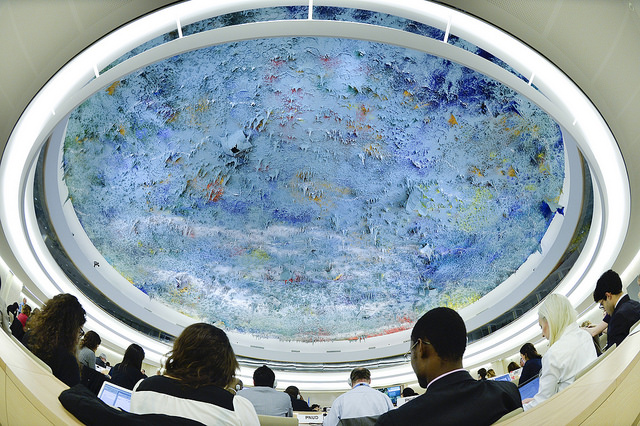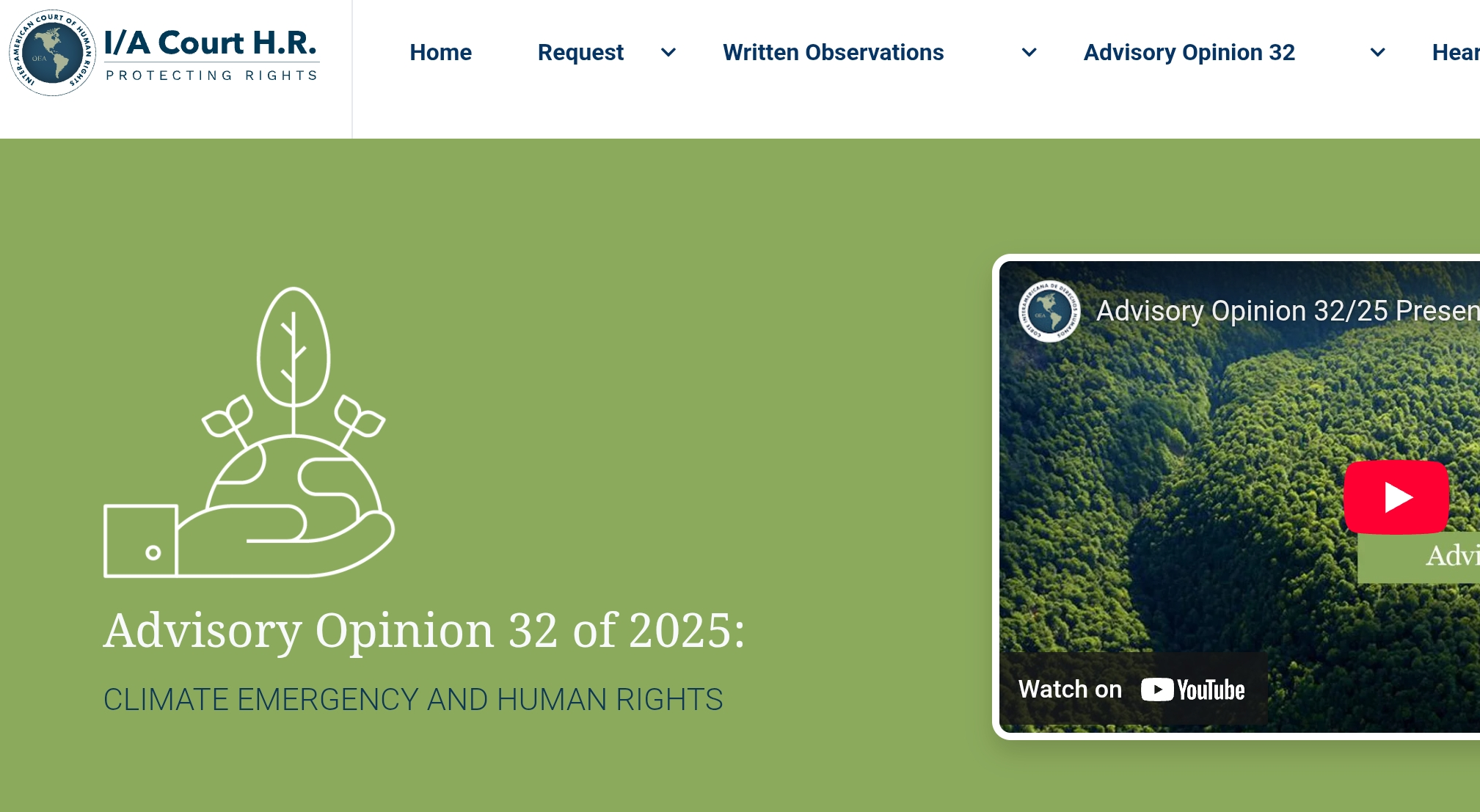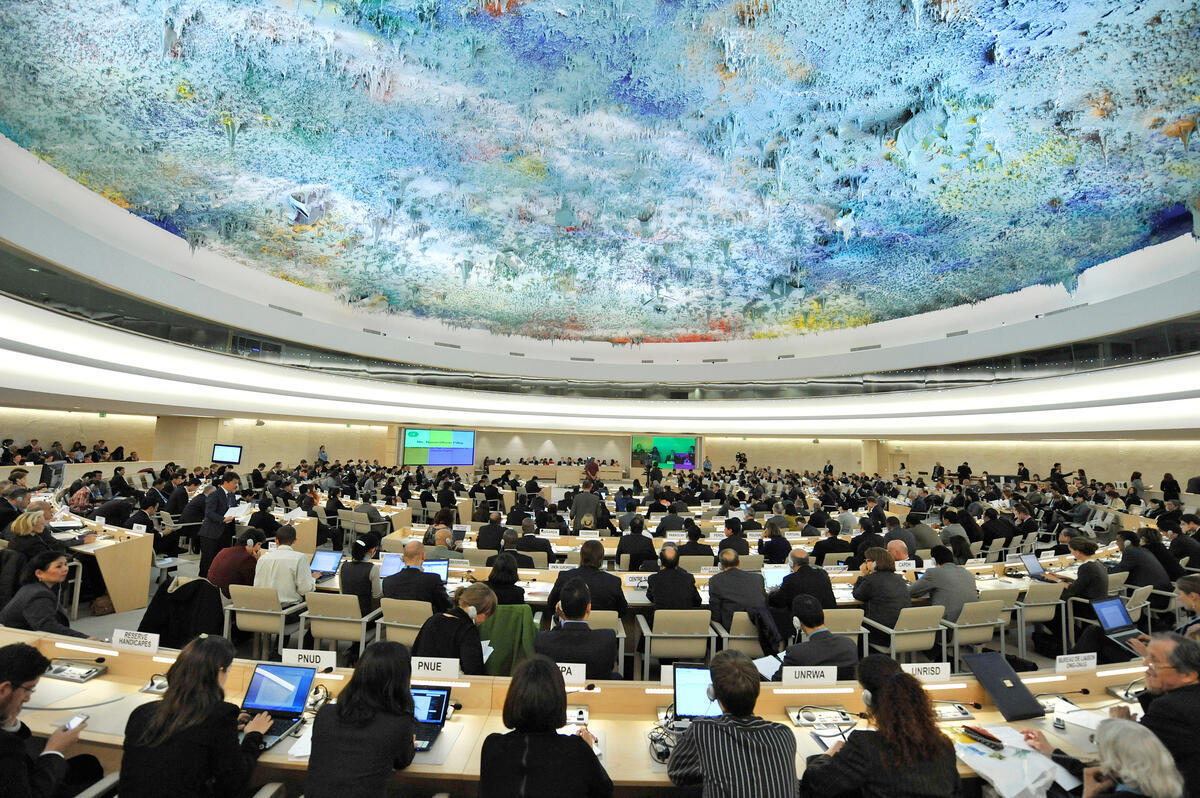Human Rights Council Elections
ISHR urges all regional groups to present competitive slates for Council elections. States should follow and deepen the practice of announcing their candidacies by the High-Level Segment of every year’s March session of the Council, at the latest. The lack of competition all but guarantees election for all candidates on a closed slate, irrespective of their human rights record. This turns the election into an appointment process that violates the spirit of the Council’s membership rules and undermines the effectiveness of the Council. Candidate States should announce and publish their voluntary pledges in a timely manner. This encourages engagement and ownership by other actors to follow up and contribute to their implementation, with the ultimate goal of improving the human rights situation on the ground.
Civil society participation at the Human Rights Council
Since 2019, civil society organisations have expressed concern regarding the Council’s adoption of efficiency measures to address the UN’s financial shortfalls and the COVID-19 pandemic. These measures disproportionately restrict civil society participation at the HRC. On 25 January 2022, 39 NGOs from across the world reiterated these concerns in a joint letter to the HRC Bureau and stressed that the renewed efficiency measures for 2022 should be evaluated primarily in terms of the Council’s accessibility and effectiveness. As observers and critical stakeholders of the Human Rights Council, we call on States and the Bureau to reinstate General Debates in all June sessions, remove the de facto cap on video participation during General Debates, and maintain the possibility to engage remotely with the Council even after easing COVID-19 related measures. States and the Bureau should also, organise broad consultations with civil society representatives before taking decisions – including budgetary decisions – that may impact on civil society participation and access, and establish a civil society focal point within the Bureau to facilitate the engagement of civil society organisations throughout the year, particularly with regard to issues that may affect civil society participation, such as evaluation of efficiency measures and ongoing discussions relating to the 2021-2026 question of the status of the Human Rights Council.
Acts of intimidation and reprisals
For the Council to be effective, it must be accessible to rights holders and victims. Those who defend human rights must be able to access and communicate with the UN and the Council freely and safely. They should not be intimidated nor suffer reprisals related to that engagement. At every Council session, States should raise individual cases, demand an immediate end to all acts of intimidation and reprisals, and follow up on accountability for perpetrators and remedies for victims.
The President of the Human Rights Council should meet their obligation to address reprisals by publicly identifying and denouncing specific instances of reprisals including through formal statements, press-briefings, corresponding directly with the State concerned, publicly releasing such correspondence, and seeking undertakings from the State concerned to investigate, hold perpetrators accountable and report back to the Council on action taken.
Resolution on human rights defenders
At the 49th session of the HRC, Norway will present a thematic resolution on human rights defenders in conflict and post-conflict situations. A group of NGOs have produced a list of 25 recommendations related to key concerns that should be addressed in the resolution. These include recommendations related to the removal of legislation that impinges upon the ability of defenders to do their work, including counter-terrorism legislation; the development of protection measures that take into account the specific needs of particular groups of defenders and the precarious nature of their situation in conflict and post-conflict contexts, and specific measures to support human rights defenders in such contexts, including in regard to the provision of cloud-based solutions for storage of documentation, flexible and reliable funding and swift responses in the case of the need for relocation of human rights defenders and their families. ISHR joins these calls and to impress upon the Council the need for a strong commitment to acknowledging and taking action to protect human rights defenders working in such contexts. In addition, we call on all UN members to monitor and report on their implementation of the resolution in a comprehensive way, sharing updates on challenges faced and progress made during relevant UN dialogues and debates.
Racial justice and equality for Africans and people of African descent
In July 2021, building on momentum from a groundbreaking report by OHCHR, the Council adopted a historic consensus resolution 47/21 which established an independent mechanism of experts on systemic racism and law enforcement. The focus was on transformative change for racial justice and equality in the context of law enforcement globally while considering the legacies of the Transatlantic Slave Trade and colonialism. For this mechanism to respond to systemic racism against Africans and people of African descent, the Council must make radical efforts and commitments to center civil society’s needs, demands, and visions for community safety, violence prevention and actual liberation from all forms of State-sanctioned violence.
Situations that continue to merit the HRC’s attention
The objective rights-based criteria, which over 70 States from all regions have committed to applying on whether a situation merits the Council’s attention, includes several criteria relating to the situation of human rights defenders and cooperation with the Council, its mechanisms, OHCHR and treaty bodies. Acts of intimidation and reprisals are the most flagrant type of non-cooperation. States should continue to demonstrate leadership, principled action and sustained follow up when the objective criteria are met, paying particular attention to attacks or restrictions against human rights defenders as an early warning sign of more widespread and systematic violations.
Human rights situation of migrants
Silence from the Council tells States that the rights of migrants and refugees – and those who defend them – can be violated with impunity. The Council must demonstrate its ability to respond to serious, widespread violations of human rights of migrants and act on the High Commissioner’s call to establish an independent monitoring of pushbacks and collective expulsions at the land and sea borders of EU and other States, and demonstrate that it can respond to human rights violations wherever they occur.
Human rights situation in China
High Commissioner Bachelet has still not released her Office’s report on grave human rights violations in the Uyghur region, six months after announcing its upcoming publication, and three months since her spokesperson indicated it would only be a matter of ‘weeks’. Further delays risk entrenching the Chinese government’s sense of impunity, harming the credibility of, and confidence in her Office’s capacity to address grave violations, some of which could amount to atrocity crimes. States should urge the High Commissioner to promptly publish her report, and present it to the Human Rights Council as a matter of utmost priority at the 49th session of the Council. The Council should take appropriate action upon publication of the report, commensurate with the gravity of human rights violations across the country, and the Chinese authorities’ unwillingness to be scrutinised by UN experts. States should ensure that multilateral discussions and action on the situation in China duly considers the common root causes and patterns of systematic human rights violations against Tibetans, Hong Kongers, as well as human rights defenders and lawyers. This includes ensuring sustained pressure around China’s abuse of national security in discourse and law, and on the widespread and systematic use of enforced disappearance under ‘Residential Surveillance at a Designated Location’ (RSDL).
Human rights situation in Egypt
The joint statement delivered by States in March 2021 at the 46th session of the HRC played a critical role in securing the conditional release of several human rights defenders and journalists arbitrarily detained throughout 2021 and 2022. Regrettably, these releases do not reflect any significant change in Egypt’s systematic attacks on civic space and human rights defenders, including arbitrary detention, torture, ill-treatment, enforced disappearances and criminalisation of the exercise of the rights to freedom of expression, association, assembly or public participation. On 3 February 2022, 175 parliamentarians from across Europe urged the HRC to establish a “long overdue monitoring and reporting mechanism on Egypt”. ISHR joined more than 100 NGOs from around the world in urging the HRC to create a monitoring and reporting mechanism on the ever-deteriorating human rights situation in Egypt. Continued, sustained and coordinated action on Egypt at the HRC is more necessary than ever. The HRC should follow up on the 2021 State joint statement and heed the calls of civil society and parliamentarians.
Human rights situation in Burundi
The Commission of Inquiry on Burundi (CoI) concluded its work at the 48th HRC session in October 2021 while a new resolution establishing a mandate of UN Special Rapporteur on Burundi was adopted, resolution 48/16. The resolution tasks the mandate with monitoring the human rights situation in the country, making recommendations for its improvement, and reporting to the Human Rights Council. While the Special Rapporteur will be unable to continue the entirety of the investigative work carried out by the CoI, they will “collect, examine and assess” information on human rights developments. Ahead of HRC48 more than 40 organisations, including ISHR, urged the Council to continue its scrutiny and further work towards justice and accountability in Burundi.
The UN Human Rights Office (OHCHR) will ensure that evidence collected by the CoI is “consolidated, preserved, accessible and usable in support of ongoing and future accountability efforts” including efforts to hold Burundian officials responsible for atrocities in front of the International Criminal Court (ICC). The Burundian government should resume its engagement with the Council and grant the Special Rapporteur, who will be appointed in March 2022, access to the country for an official visit.
Human rights situation in Nicaragua
A year after Council resolution 46/2, civil society reporting indicates no meaningful action has been taken by Nicaragua to implement any of the Council’s recommendations to the government. Instead, it has deepened its crackdown on human rights defenders and any form of dissent, and further closed civil society space ahead of the November 2021 electoral process. The government’s absolute disregard for cooperation with international and regional mechanisms, including the treaty bodies, is an additional sign that the government does not intend to revert course on the country’s human rights crisis. ISHR, jointly with the Colectivo 46/2, urges the Human Rights Council to establish an independent mechanism to investigate grave human rights violations since April 2018 in Nicaragua, as well as their root causes. The mechanism should verify alleged grave violations, identify perpetrators, and preserve evidence, with a view to long-term accountability processes.
Human rights situation in Saudi Arabia
According to ALQST’s 2021 annual report, for a short time in early 2021, intense global pressure on Saudi Arabia’s leaders to improve their dismal human rights record resulted in some minor reforms and concessions, yet, when the pressure eased, the Saudi authorities resumed their habitual pattern of abuses with renewed intensity. A number of high-profile women human rights defenders and prisoners of conscience were conditionally released, but they remain under severe restrictions which means that while they are released, they are not yet free. Saudi authorities continue to crackdown on freedom of expression and hand down lengthy prison sentences to human rights defenders. Saudi Arabia is sensitive regarding its reputation and susceptible to international pressure. ISHR joins ALQST and other civil society organisations in urging the HRC to heighten its scrutiny after three joint statements in March 2019, September 2019 and September 2020, by following up through the adoption of a resolution establishing a monitoring and reporting mechanism on the human rights situation in Saudi Arabia.
Human rights situation in Sudan
On 5 November 2021, the Human Rights Council held a special session to address the ongoing situation in the Republic of Sudan and mandated an Expert on human rights in Sudan to monitor and report on the situation until the restoration of its civilian-led Government. The HRC must extend the reporting mandate of the Expert as the human rights situation is deteriorating. The military is closing the civic space for women’s rights groups and women human rights defenders, including by stigmatising women’s rights groups as terrorists or drug abusers. The recent arrests of women human rights defenders are part of a systemic attack against WHRDs in Sudan. The military and security forces are using social media and traditional media to defame women protesters. Women’s rights groups and WHRDs are facing a new wave of attacks that include framing charges to prolong the detention of WHRDs and defame the women’s rights movement. The military reinstated the authorities of the former regime’s security forces in December 2021 in the emergency order number 3. The new emergency order gave Sudanese security complete impunity and protection from accountability for any form of violations on duty. Sudanese security forces have a well-documented history of sexual abuse and torture of women detainees. WHRDs in detention are at risk of maltreatment, torture, and sexual violence.
Human rights situation in Venezuela
Given the gravity of the human rights situation in Venezuela, the Council should continue to focus on accountability for past human rights violations and prevention of future violations by extending the mandate of the Independent International Fact-Finding Mission on the Bolivarian Republic of Venezuela for at least another year when it comes up for renewal in September. Venezuelan civil society continues facing restrictions and attacks on their work. The head of human rights organisation Fundaredes, has now been arbitrarily detained for 224 days. Council sessions are an opportunity for States to express concern about the restrictions on civil society, and to enquire about the implementation of prior recommendations made to Venezuela by both OHCHR and the Mission. Despite being a Council member, Venezuela has yet to allow the Council’s own fact-finding mission access to the country, something the Council as a whole should denounce.
Human rights situation in Yemen
For nearly seven years the people of Yemen have been victims of innumerable war crimes and human rights abuses. Until October 2021, the fact that the UN Human Rights Council’s Group of Eminent Experts (GEE) was documenting crimes by all parties to the conflict and reporting them to the world attested to a commitment to address widespread impunity for such crimes. It signaled to civilians in Yemen that Member States of the United Nations were not turning a blind eye to their suffering. But not anymore. Saudi Arabia, backed by the United Arab Emirates, the leaders of a military coalition in the Yemen conflict, lobbied Human Rights Council members to end the GEE’s impartial monitoring and reporting. As a result, Council members narrowly rejected a resolution whose adoption would have renewed the GEE’s mandate, dealing a serious blow to accountability efforts. ISHR joined a coalition of NGOs in continuing to call on UN member states to ensure the establishment of an independent and impartial body that would investigate and publicly report on the most serious violations and abuses of international law committed in Yemen, while also collecting and preserving evidence and preparing files for possible future criminal prosecution.




